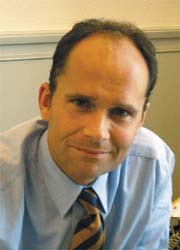Take a new approach to hospital management Look in the crystal ball and share risks with suppliers
Dr Jaeger will demonstrate how to ...

Dr Jaeger is a medical doctor (for his PhD theses he worked on molecular mechanism of biliary cholesterol secretion). His gained experience in the business side of healthcare during his five years as a consultant with McKinsey.
In 2005 he joined Vivantes, which runs 5,000 hospital beds at nine hospital sites in Berlin. These serve around 200,000 in-patients and 300,000 out-patients annually. Vivantes also runs nursing homes for about 2,000 inhabitants and engages in specialised out-patient clinics.
Rising from the ashes – lessons learnt from six years of turnaround process of one of the largest hospital providers in Europe.
When the Vivantes project was launched, by merging 10 hospitals and 14 nursing homes previously run by the regions of Berlin, nobody knew whether that experiment would work. Putting together more than 5,000 beds at 10 sites in Berlin – a mixture of ancient buildings and new architectural experiments of the 1980s – was a challenging idea, with many sceptics. Now, six years later – and after a period close to bankruptcy – Vivantes has shown that you can have efficient structures and operations as a non-private hospital provider.
Over the last years, Vivantes reduced costs of about 250 million euros, while increasing cases treated by a couple of percentages. Being one of the most efficient hospitals in Berlin – in one of the most competitive hospital markets – is a good starting point for further growth.
Centralise administration processes and specialised medical services – the outcome rewards the struggle
Centralization, standardization and specialization – all principles run against people wanting to keep everything like it is and has been. But it is worth the struggle. Seeing new consultants coming in with a new attitude towards professionalism and also quality parameter outcomes rising due to centralized provision of specialized care (e.g. first line breast cancer treatment with remote adjuvant therapy) highly reward the effort to start the ignition.
Look ahead - yes, there is a scientific way to gaze into a crystal ball
Nothing is as sure as the future – true in medicine. Illness is largely driven by age and lifestyle – as well as genetic predisposition. Taking the current onset of in-patient treatment (i.e., prevalence and incidence) and extrapolating it by taking the demographic changes into account, clearly gives a precise glimpse of what we will face in the future. We did that prognosis for Berlin and discussed both outcome figures and influencing trends (e.g., new treatment opportunities) in our medical boards. Based on fact-driven information we have planned future case volumes and structures as well as the staff necessary to serve those needs of the population.
Change your clinicians´ perspectives – let them talk to local GPs, but in a focused way
Most in-patient cases come via general practitioner (GP) referral. So, the GP is mainly the gatekeeper for which hospital to choose. The influence of patients´ choice will increase, but the GP is the key – at least for the time being. We asked our consultants to talk to the GPs – on a more systematic and regular basis. We helped them to identify who sends more, or less, patients by using monthly statistics. Furthermore, based on demographic data, we were able to prioritise the list of GPs to see – those with high patient potential and little Vivantes market share are top of the list. That sounds easy in theory – but getting that effort to life is not.
Change your perspective – in everyday business, take the patient’s viewpoint
Current market research clearly shows that patients mainly care about quality – that is not new. But how do they really feel about hospitals? What is their main concern? And what do they base their first impression of a hospital on? A qualitative market research revealed in detail how patients and their relatives feel about hospitals. Not surprisingly, anxiety leads all emotions and hardly allows an unbiased perception of information. Getting beyond that feeling of fear is key – there are many ways to demonstrate that the hospital tackle that issue seriously.
Innovate co-operation – take your suppliers on board, and share risks
PPP is a modern buzzword in hospital management – but what comes next? Is ‘sale-and-lease-back’ the answer to short term investment barriers? Who pays the bill in the long run? Looking at different industries where high volume investments are common, what can we learn from them? Clean-room technologies for chip production or drug research labs and manufacturing sites, these all use an ‘open book’ for fair compensation.
Hospitals could follow this, possibly by starting with medical product suppliers. Instead of paying for each item or each service (i.e. usage), we can see a risk sharing approach, as we have in the DRG compensation system. We, as a hospital provider, are reimbursed by case, not by every service or syringe used on that case. Why don’t we also have suppliers who get reimbursed by case? Combined with an ‘open book’, i.e. sharing insights about real cost structures and adding capital costs and surpluses, that trust-building partnership could be the next S on the curve.
08.03.2007





